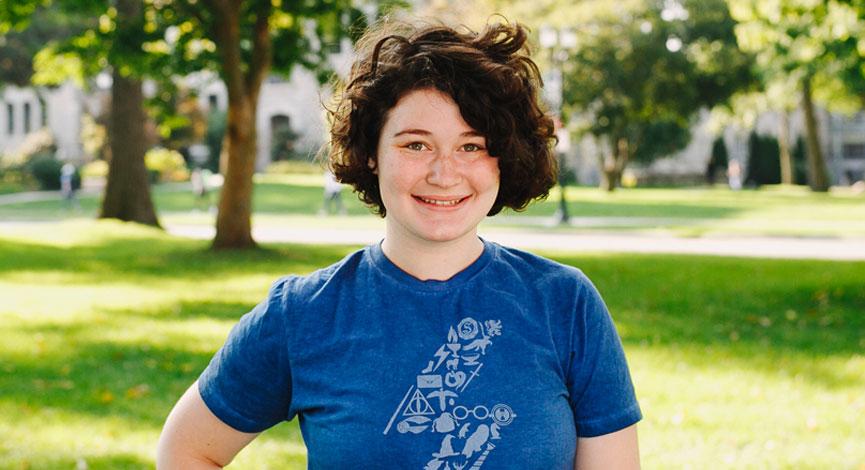
In just her sophomore year, Emma Penrose has already started to broaden her understanding about the complex issues of the world. Human trafficking is one of those.
A deeper understanding also comes with a sense of social responsibility and compassion, which is why Emma decided to put herself out there and get involved with Berg STOP, a campus organization comprised of students, faculty, staff and community members dedicated to spreading awareness about the crime of human trafficking.
This year, Emma is serving as Berg STOP president. In that role, she encourages fellow students to make time to attend several events as part of Human Trafficking Awareness Week next week to learn more about the growing problem.
“People need to know that trafficking happens in many more ways than they may understand,” Emma says. “People being sold is not even close to the only form of trafficking, and the more we understand the other forms, the more we can do to help prevent them and save people.”
Locally, sex trafficking is perhaps the most prevalent form. However, as Emma points out, there are other ways people are victimized. According to the U.S. Department of Health & Human Services, labor trafficking – a fundamental violation of human rights and an example of modern-day slavery – occurs about three times more frequently as sex trafficking globally.
This year, the keynote speakers for Human Trafficking Awareness Week, Harold and Dancy D’Souza, found themselves in the midst of a horrible labor trafficking situation.
In 2003, Harold D’Souza relocated his family to the U.S. from their native India in search of the American dream. He had been promised a $75,000 job at a manufacturing company that never materialized. Over the next 19 months, Harold, Dancy and their two young sons lived a nightmare. He and Dancy were forced to work 15-hour days at a Cincinnati restaurant for no pay. Indebted to the restaurant owner, they also endured horrible living conditions in their home.
Fortunately, with the help of law enforcement and the support of non-profit and community organizations, the D’Souza family was able to break free, escaping from the restaurant owner and eventually securing the American dream they longed for. Today, Harold De’Souza is successful in his job as a senior supply chain associate at Cincinnati Children’s Hospital Medical Center, where he has worked for six years. He was recently appointed by President Obama to the U.S. Advisory council on Human Trafficking.
Emma encourages students to hear the D’Souzas’ message so they can learn more about the world around them. “They will bring a different viewpoint and provide more insight about how to prevent trafficking and save lives,” she says.
“The more we can understand, the more we can make the world a safer place for everyone, not just those who are privileged.”
Through the week’s events, Emma hopes others gain a deeper understanding as well. “I think we will take away a better understanding of human trafficking and a hope to change the way things are. We are a group about change, and if people can have the same goal, we can achieve it together.”
Schedule of events
Monday, January 23
Speakers: Harold & Dancy D'Souza, Survivors of Labor Trafficking. Harold was appointed by President Obama to the U.S. Advisory Council on Human Trafficking
3:30 PM Speaking to study abroad students about international travel safety - Campus Center 120
6:00 PM Keynote Address, "From Modern Day Slavery to the White House" - Wickham Great Hall
Tuesday, January 24
Speaker: Raven Loaiza, MSW, Allen County Victims Services
11:00 AM "Recognizing the Signs of Human Trafficking" - University Commons
Thursday, January 26
Speakers: Dr. Kristen Williams and Emma Penrose
11:00 AM Film Screening and Discussion on "What Happened to the Girl Next Door?" - Campus Center 120